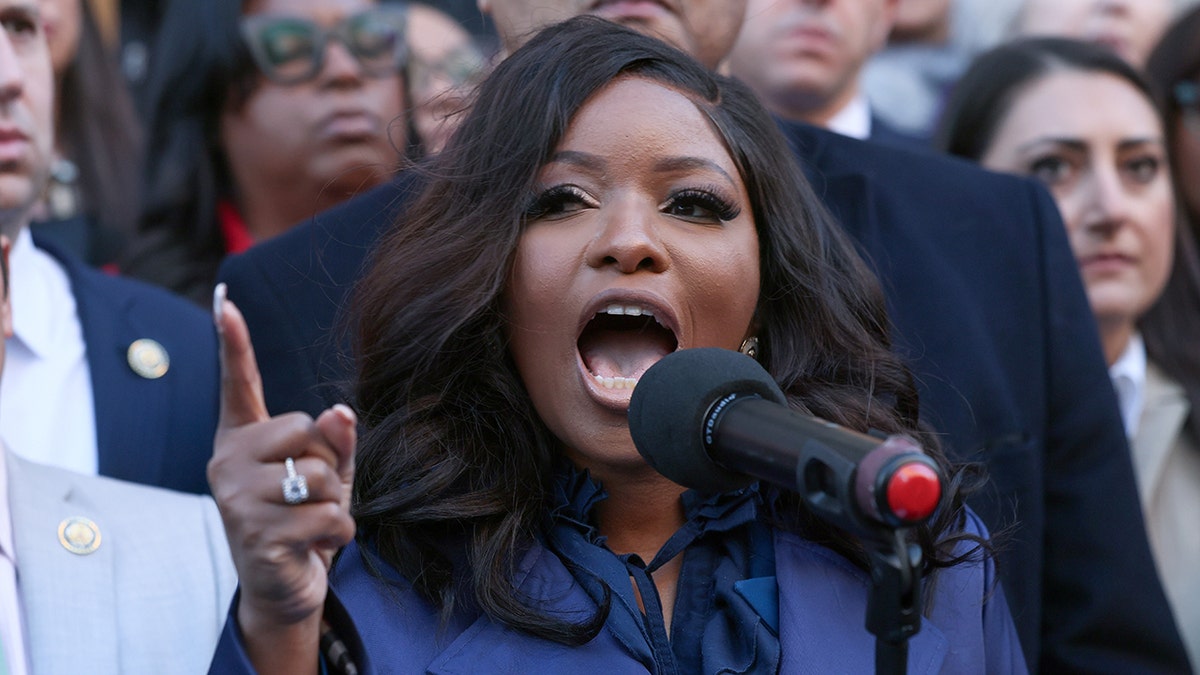Just hours ago, Jasmine Crockett shattered the silence surrounding one of the most explosive issues in recent political discourse, responding directly to Karoline Leavitt’s shocking demand for Jeffrey Epstein’s records to be handed over to the MAGA movement. This bold exchange has ignited a storm of speculation, heated debates, and intense online conversations that show no signs of cooling down anytime soon.

The background to this tense moment is both complex and charged. Karoline Leavitt, known for her outspoken rhetoric and fierce loyalty to the MAGA camp, made waves when she publicly called for full access to Epstein’s dossier—a collection of files long shrouded in secrecy and controversy. Her statement wasn’t just a casual request; it was a demand aimed at unearthing information she claimed had been deliberately suppressed from the public, especially political factions eager to expose hidden truths.
Leavitt’s call for transparency, however, came bundled with accusations that the Epstein files had been purposely withheld from influential figures opposed to the MAGA ideology. This assertion quickly polarized audiences, framing the Epstein controversy not just as an investigation into criminal activity, but as a broader battlefield for political leverage and public perception.
Enter Jasmine Crockett, a figure with a reputation for measured but firm leadership. Her response, delivered through a carefully crafted statement, struck a chord with both supporters and critics. Crockett didn’t just dismiss Leavitt’s claims outright—she confronted them head-on, accusing Leavitt and her allies of exploiting tragedy and trauma for political gain. Her words were sharp but restrained, urging for accountability and care in how sensitive information is handled and shared.

What’s notable about Crockett’s response is how it appealed to a broader sense of justice and responsibility. She acknowledged the public’s right to know but emphasized that rushing to politicize deeply painful and complex issues only serves to deepen divisions. Her message was clear: the Epstein records aren’t just political weapons—they are tied to real victims and serious crimes that demand integrity in how investigations proceed.
The fallout online was immediate and intense. Social media platforms exploded with reactions ranging from fervent support for Crockett’s call for caution to fiery arguments defending Leavitt’s stance on full disclosure. Hashtags flared, opinion pieces popped up, and debates stretched across podcasts, cable news, and everyday dinner tables. This was more than politics as usual; it was a clash of values, a test of public patience, and a reminder of how sensitive and turbulent the Epstein saga remains.
What makes this exchange so significant isn’t just the personalities involved or the headlines it generated—it’s the way it encapsulates an ongoing struggle over power, transparency, and truth in the modern political landscape. With Epstein’s name tied to some of the highest-profile individuals and most secretive networks, every piece of information carries weight far beyond the immediate facts.
For many observers, Crockett’s stand is a call for a more thoughtful approach amidst a noisy and fragmented media environment. She challenges both political sides to remember the human stories behind the headlines and to resist turning grave criminal investigations into mere chess pieces in partisan battles.

Yet, the debate is far from resolved. Questions linger about how much information should be public, who controls these narratives, and whether justice can ever be fully served when politics intertwines so deeply with crime and scandal.
As the hours turn into days, all eyes remain glued to what may come next—new revelations, responses from other leaders, or perhaps even legal maneuvers that could shift the balance yet again. Jasmine Crockett’s explosive response has made one thing clear: the Epstein files still have the power to unsettle, divide, and demand our attention.
In this high-stakes drama unfolding on the national stage, it’s easy to get lost in the noise. But at its core lies a crucial truth—that justice, truth, and compassion should guide the way forward, no matter how politically charged the battle becomes. Whether through fiery exchanges like this or quieter, more deliberate efforts, the quest for accountability continues—and the nation watches closely.